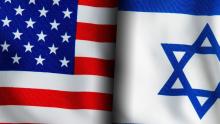History of Israel - USA Relations
See the timeline of the history of Israeli-American relations.

The United States, under President Harry S. Truman, becomes the first country to recognize the State of Israel, just 11 minutes after its declaration of independence.

The U.S. supports Israel's admission to the United Nations.

The U.S. and Israel sign the first bilateral defense cooperation agreement: The Mutual Defense Assistance Agreement

The Fulbright educational program is established between the United States and Israel.

The Eisenhower Doctrine is established, underlining U.S. support for Israel and other nations in the Middle East against Soviet aggression.

President John F. Kennedy authorizes the first significant U.S. arms sales to Israel, including Hawk anti-aircraft missiles.

Six-Day War – The U.S. supports Israel diplomatically during the conflict and the subsequent territorial gains.

The U.S.-Israel Binational Science Foundation established

Yom Kippur War – The U.S., under President Richard Nixon, conducts an airlift of supplies to support Israel, demonstrating strong military backing

President Richard Nixon becomes the first sitting U.S. president to visit Israel, meeting with Prime Minister Golda Meir and President Ephraim Katzir

Establishment of the U.S.-Israel Binational Industrial Research and Development Foundation (BIRD).

President Jimmy Carter visits Israel to solidify peace efforts between Israel and Egypt. Meets with Prime Minister Menachem Begin and President Yitzhak Navon. Later that month, the Egypt-Israel Peace Treaty was signed in Washington, D.C.
The U.S.-Israel Binational Agricultural Research and Development Foundation (Bard) signed.

Memorandum of Understanding (MOU) on strategic cooperation signed, marking formal strategic and military cooperation between the U.S. and Israel.

The U.S. and Israel sign the General Security of Information Agreement, a bilateral defense cooperation agreement.

The U.S. grants Israel Major Non-NATO Ally status, which boosts military and economic ties. Later that year, Prime Minister Shimon Peres addressed a joint session of the U.S. Congress.
U.S.-Israel Free Trade Agreement signed, the first free trade agreement for the United States.

Madrid Conference – The U.S. hosts the peace conference aimed at reviving the peace process between Israel and its Arab neighbors.
Later that year, Prime Minister Yitzhak Shamir addressed a joint session of the U.S. Congress and a a Mutual Logistics Support Agreement defense cooperation agreement was signed.

The Oslo Accords between Israel and the Palestine Liberation Organization (PLO) were signed in the White House

Israel-Jordan Peace Treaty signed in Israel, attended by President Bill Clinton.

Prime Minister Benjamin Netanyahu addresses a joint session of the U.S. Congress.

President Bill Clinton visits Israel, engaging in peace negotiations with Israeli and Palestinian leaders.

Camp David Summit – President Bill Clinton hosts the summit aiming to resolve the Israeli-Palestinian conflict.

George W. Bush administration begins strengthening military and economic aid to Israel, including supporting Israel’s fight against terrorism during the Second Intifada.

The U.S. and Israel sign a 10-year Memorandum of Understanding on military aid, pledging $30 billion.

President George W. Bush makes his first official visit to Israel, focusing on peace negotiations. Later that year, President Bush visited Israel again and attended its 60th anniversary celebrations.

“BIRD Energy” was established after the U.S.-Israel Energy Cooperation Program was authorized by Congress in the Energy Independence and Security Act of 2007. “BIRD Energy” was created to promote bilateral cooperation in clean renewable energy technologies.

Prime Minister Benjamin Netanyahu addresses a joint session of the U.S. Congress

President Barack Obama visits Israel, strengthening U.S.-Israel relations and discussing regional security issues with Prime Minister Benjamin Netanyahu and President Shimon Peres.

Prime Minister Benjamin Netanyahu addresses a joint session of the U.S. Congress

U.S. and Israel sign a $38 billion military aid package for the next decade.

President Donald Trump visits Israel recognizes Jerusalem as the capital of Israel, and moves the U.S. embassy from Tel Aviv to Jerusalem.

Abraham Accords – The U.S. brokers normalization agreements between Israel and several Arab countries, including the UAE and Bahrain.

President Joe Biden visits Israel to reaffirm U.S. support and discuss regional security and cooperation, meeting with Prime Minister Yair Lapid and President Isaac Herzog. During this visit, the Jerusalem U.S.-Israel Strategic Partnership Joint Declaration was adopted.

The U.S. continues to provide significant military aid and supports Israel in regional security matters.
